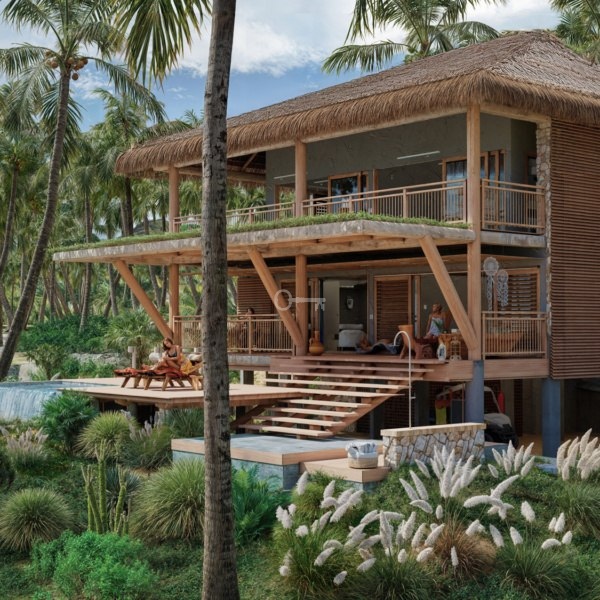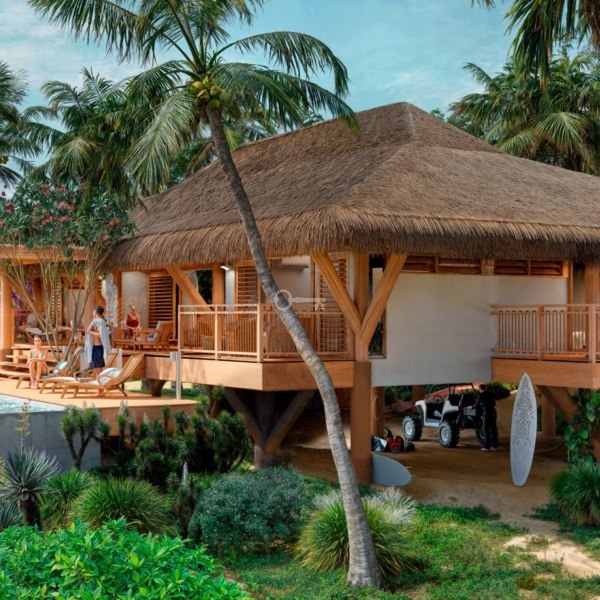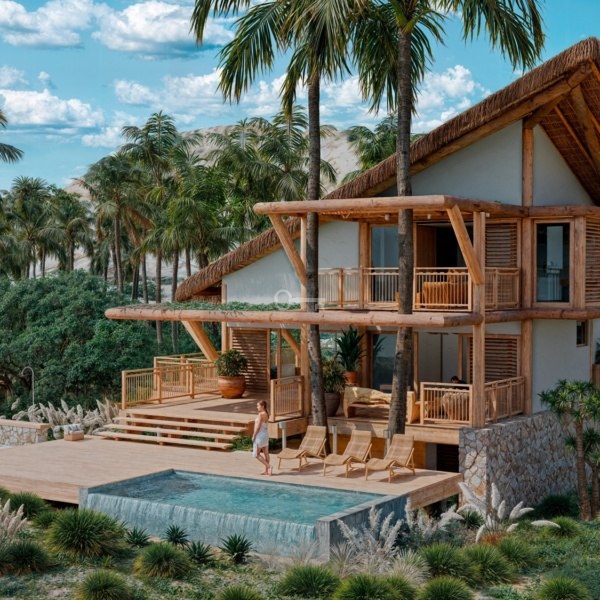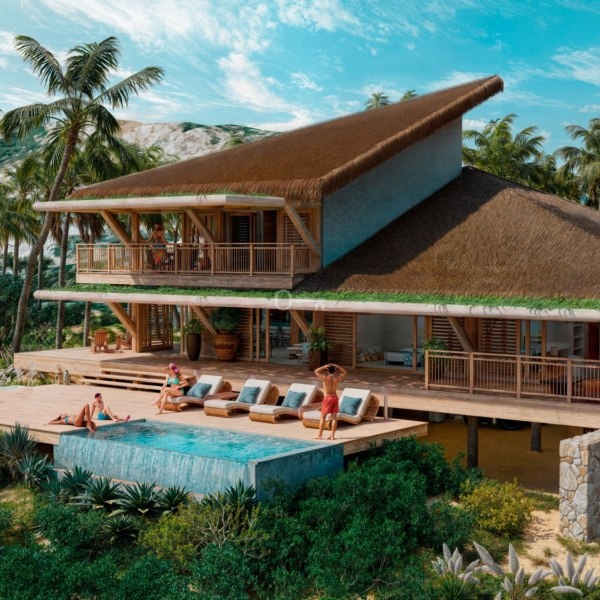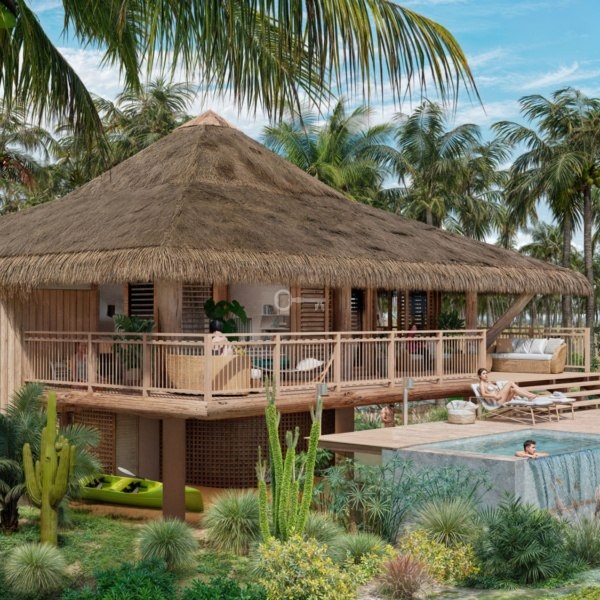Brazil has long captivated travelers with its golden beaches, tropical climate, and the extraordinary energy of its cities. Today, however, this South American paradise attracts not only tourists but also investors seeking new, exclusive destinations. Luxurious oceanfront apartments and villas in prestigious resorts, combining an exotic lifestyle with the prospect of long-term value appreciation, are becoming increasingly popular. Brazil is becoming synonymous with a new quality of investment – a place where exoticism meets elegance, and the dream of owning a home in paradise becomes a reality.
How to buy property in Brazil as a foreigner? Legal requirements and restrictions for foreigners coming to Brazil
Foreigners can purchase real estate in Brazil as long as they have a CPF (Cadastro de Pessoa Fisica) tax identification number issued by the Brazilian Tax Office. Special restrictions apply in certain situations, such as the purchase of large agricultural properties or those located near protected areas for national security reasons. However, for example, properties sold as part of the Aventora development are not subject to restrictions on their acquisition by foreigners.
CPF Number and Other Administrative Formalities
CPF numbers can be obtained at Brazilian diplomatic missions abroad, tax offices in Brazil, through a representative, or online for non-resident foreigners.
Documents required to obtain a CPF:
- valid passport;
- completed application form (Formulário Ficha Cadastral de Pessoa Física);
- proof of address;
- document proving parentage (including parents’ details);
- selfie with passport (personalization page) if applying online.
CPF number issuance usually takes a few days. Important: The Aventora project legal team offers free support in obtaining a CPF number for clients interested in purchasing property in the project.
Additional documents, besides the CPF, required for property purchases:
- Valid passport: certified copy;
- For foreigners residing in Brazil, a foreign national identity card (RNE/CRNM) can be used;
- Proof of address: document issued in Brazil or abroad (for foreigners without permanent residence in Brazil)
- Certificate of civil status.
Important: For documents issued outside of Brazil, they must be apostille-stamped and translated into Portuguese by a sworn translator.
Ownership and Registration in the Electronic Land Registry
Full ownership of real estate in Brazil is acquired only after the registration of the deed of purchase and sale of the real estate (escritura pública de compra e venda) at the relevant land registry office (Cartório de Registro de Imóveis).
Key rules:
- The notary prepares the notarial deed of purchase and sale of real estate;
- The deed is registered in the Cartório de Registro de Imóveis – registration confirms the legal title (ownership) of the purchased property;
- Since 2021, an electronic registration system has been in operation in Brazil, streamlining the real estate purchase process;
- Registration requires, among other things, a CPF number, an ID document, and proof of tax payment (including ITBI – property transfer tax).
Permanent residence card and purchasing real estate in Brazil
Foreigners do not need a residence card or registration in Brazil to purchase real estate. The requirements for foreigners are described above. Purchasing real estate above a certain threshold may entitle you to a Brazilian residency title (residência por investimento).
Residência por Investimento Imobiliário (Residência por Investimento Imobiliário):
Since 2022, Brazil has offered permanent residency to foreigners investing in real estate. The minimum investment is 1,000,000 Brazilian reals in most of the country, but in selected regions – such as Rio Grande do Norte, where the Aventora project is being implemented – the threshold has been lowered to 700,000 Brazilian reals. The property being purchased must be registered, purchased with funds from abroad, and intended for residential or rental purposes, not solely for speculative purposes.
To obtain residency, documents confirming the transaction are required, including a notarial deed of purchase, proof of registration in the land and mortgage register, and confirmation of the transfer of funds from abroad. It is also necessary to present the buyer’s personal documents, such as a passport and CPF, along with any translations, as well as a property use plan specifying whether the property will be used for personal use or rental purposes.
The entire process takes approximately three months and requires the assistance of a lawyer, which is mandatory. The Aventora team provides a full set of project documents necessary to complete the procedure.
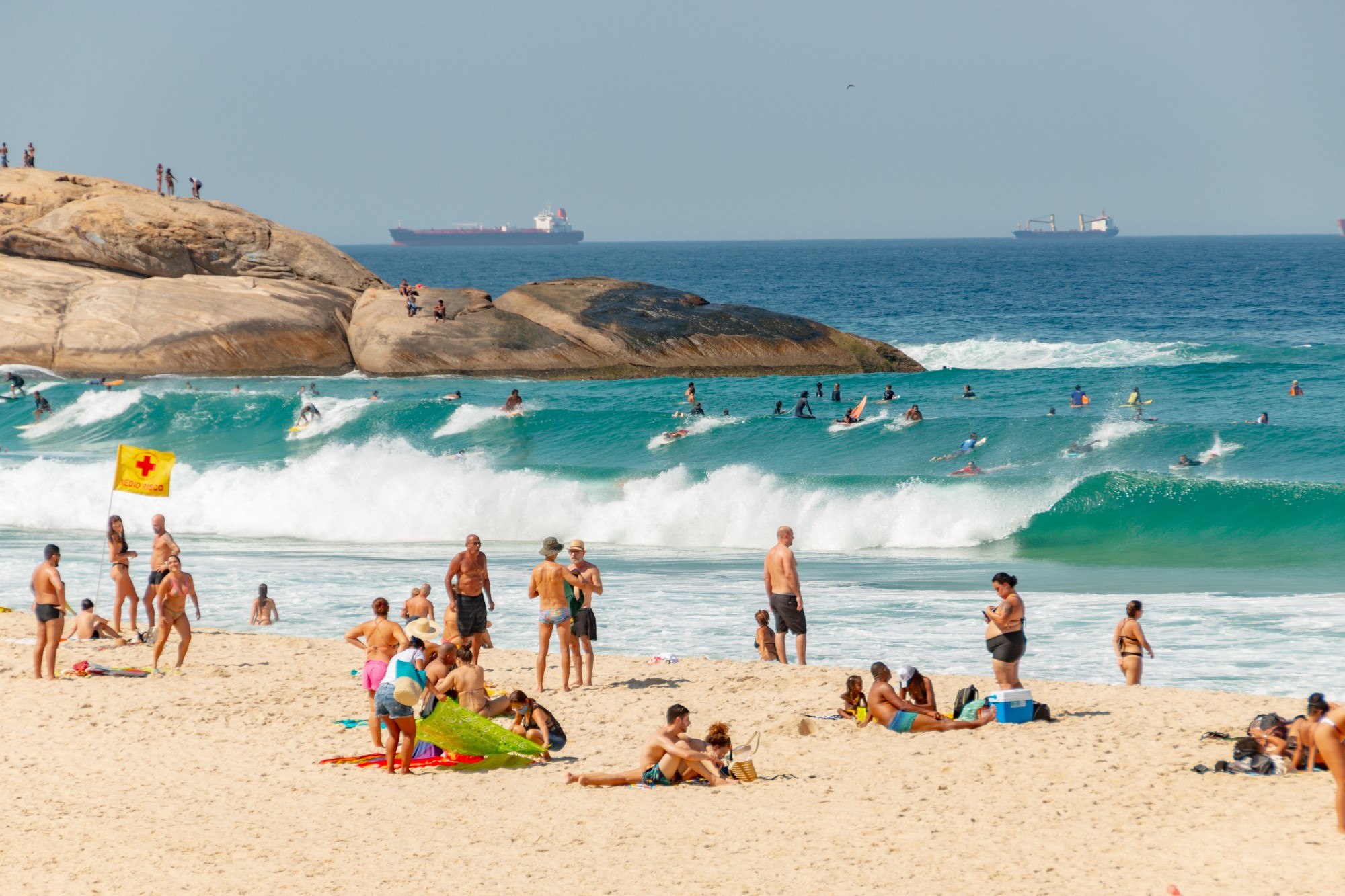
Taxes and fees related to the purchase of real estate
Purchasing real estate in the state of Rio Grande do Norte (RN), Brazil – location of the Aventora project:
- The preliminary agreement (contrato de promessa de compra e venda) does not involve the payment of taxes or notary fees;
- At the notarial deed stage, the buyer bears the costs:
- ITBI – real estate transfer tax (2–4% of the value, depending on the city; e.g., up to 3% in Natal),
- notary and registration fees.
- The total transaction cost is usually around 5–6.5% of the property value.
Other taxes related to real estate ownership in Brazil:
IPTU – annual real estate tax
- IPTU (Imposto Predial e Territorial Urbano) is an annual municipal tax imposed on property owners;
- It is calculated based on the property’s cadastral value (determined by the city hall) and the local rate, which is usually between 0.3% and 1.5% annually – in the case of a project Aventora estimates the average value of this tax at approximately BRL 16,000 per year;
- The obligation to pay this tax rests with the property owner.
Taxation of rental income for non-residents
- Rental income earned by non-residents (individuals outside Brazil) is taxed with a flat-rate tax of 15% of the gross rent;
- The tax is collected at source – the payment is made by the tenant or property manager using a special form (DARF);
- The property manager’s commission, maintenance costs, and the IPTU tax can be deducted from the tax base – in this case, the net amount is taxed.
Purchasing real estate in installments: possibilities and conditions
Purchasing directly from the developer: The most common form of purchase in installments, especially in the case of new investments.
Conditions:
- Own contribution required (usually 15–30%);
- Monthly installments are determined based on the construction schedule or in the form of an internal loan (financing by the developer);
- Possible additional fees upon key handover.
No bank loan required – many companies offer direct financing, simplifying the formalities for foreigners.
As part of the Aventora project, property purchases can be made on an installment basis, which includes a down payment and repayment of the remaining amount in installments (monthly, semi-annual, or annual) during the construction period, in accordance with the terms agreed in the contract. The outstanding balance is subject to indexation – in the case of BRL payments, according to the INCC and IGP-M indices; in the case of EUR-denominated contracts, according to the European HICP (Harmonized Index of Consumer Prices) published by Eurostat; and in the case of USD-denominated contracts, according to the US CPI (Consumer Price Index) published by the Bureau of Labor Statistics, with interest calculated at the agreed rate.
Financing for Foreigners – Available Options:
In Brazil, it is possible to obtain a mortgage loan, but it is only available from certain banks and requires permanent residency and documented income in the country. For non-tax residents, the process can be complicated and time-consuming. For this reason, foreigners most often use financing offered directly by the developer. This solution is characterized by simplified formalities, does not require the presentation of a credit history in Brazil, and the transaction itself is based on a purchase and sale agreement with the option of paying in installments.
Types of real estate available in Brazil (data for 2024-2025)
The Brazilian market offers a wide range of properties, from luxury city apartments to unique beachfront villas to expansive agricultural lands. Understanding the specifics of each segment is crucial to identifying the most promising investment opportunities.
Seaview apartments and beachfront condominiums
The segment of properties with direct beach access and ocean views is one of the most desirable in the Brazilian market. These investments are concentrated primarily in the southern and southeastern regions of the country, renowned for their high-quality infrastructure, safety, and prestige. Popular locations include Rio de Janeiro, Florianópolis, Itajaí, Balneário Camboriú, and Itapema.
While Brazil’s southern and southeastern coasts have dominated the segment of exclusive beachfront properties for years, the Nordeste region, offering expansive, pristine beaches, more affordable prices, and growing tourism potential, is also attracting increasing investor attention. States such as Rio Grande do Norte and Ceará combine scenic beauty with the dynamic development of hotel and residential infrastructure, creating attractive conditions for both development investments and the purchase of unique vacation rentals. An example is the Aventora project in Baía Formosa, Rio Grande do Norte state – a villa complex with direct beach access, designed with sustainability and comfortable exclusivity in mind. This development stands out for its combination of high-standard finishes, eco-friendly solutions, proximity to protected nature areas, and the unique atmosphere of authentic local culture. Nordeste, previously perceived primarily as a domestic tourist destination, is increasingly becoming a popular choice for foreign investors who recognize its potential to increase property values, particularly in the premium and eco-luxury segments. 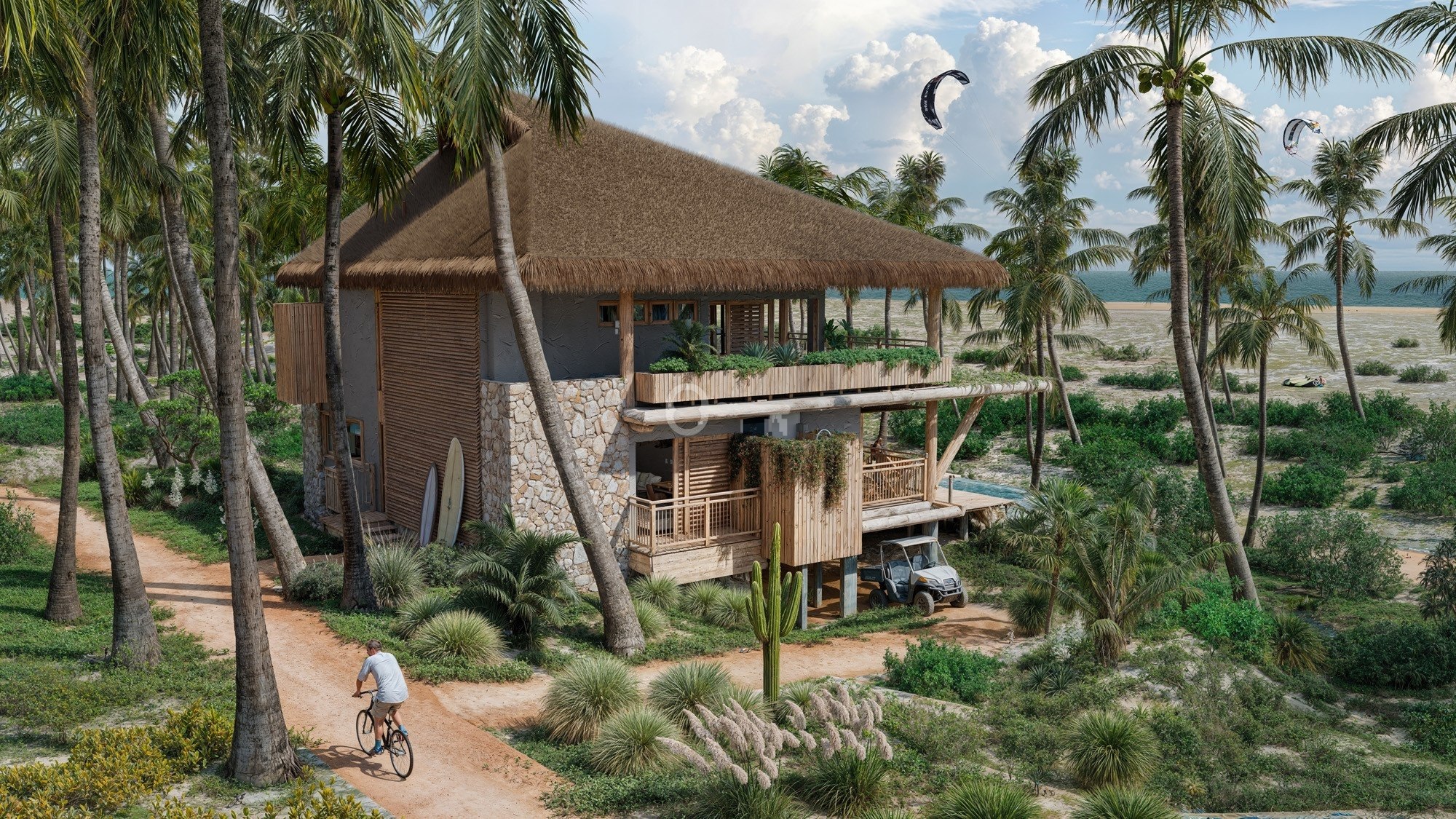
Luxury villas and residences in prestigious locations
The most luxurious villas and residences in Brazil are concentrated in prestigious metropolitan areas (Leblon, Ipanema, Jardim Europa) and renowned resorts such as Trancoso in Bahia, a symbol of so-called “barefoot luxury.” Prices here reach R$25,939/m² in São Paulo and R$22,500/m² in Leblon. The increase in demand in 2025 – 19% for houses compared to 12% for apartments – reflects the global trend of seeking privacy, space, and self-sufficiency.
An example is the modern villas in the Aventora project, offering private pools, panoramic ocean views, smart home systems, and eco-friendly solutions. These properties, often located in gated communities (condomínios fechados), have the potential to appreciate faster than high-rise apartments, and their purchase can be grounds for obtaining residency in Brazil (more on this in section 1.4).
Investment Apartments and Rental Properties
The Brazilian rental market is among the most profitable in the world, making it attractive to investors seeking passive income. Compact units—studios and one-bedroom apartments—located in business centers, university districts, and popular tourist areas offer the greatest potential. Key cities for this type of investment include São Paulo, Rio de Janeiro, Florianópolis, and emerging markets such as Recife and Fortaleza.
According to 2024 data from FGV/QuintoAndar, the average rental return in Brazil is approximately 6.1% per year (net) for long-term rentals, although industry reports also indicate gross values, calculated without expenses, as high as 19.1%. Such high rates mainly apply to specific niches, such as short-term rentals in dynamically developing yet still relatively affordable neighborhoods. In downtown Belo Horizonte, reported yields can reach as high as 36.6% per annum (gross), while in Jardim São Luís in São Paulo, they reach 24.7%. However, these figures should be approached with caution – a short-term strategy requires active management and in-depth knowledge of the local market.
More traditional long-term rentals offer more stable, albeit lower, yields – typically 4-7% per annum net. Vacation rentals in popular resorts can generate 8-12% gross. The average rental rate in 2024 was R$48.12/m², with São Paulo leading the way with R$57.59/m². Analyses indicate that a hybrid strategy, which involves renting a property for five years and then selling it, can generate a total return of approximately 16.4% per annum gross (rental income + capital appreciation).
For comparison, the projected rate of return for the Aventora Villas project, after taking into account all operating costs and withholding tax for tax residents in Poland, could reach 15.32% net per year.
Building Land and Agricultural Land: Differences and Limitations
The Brazilian land ownership legal system is complex and creates distinct regulatory regimes for different types of land, which is of fundamental importance for foreign investors:
- Urban land (Urban terrenos): In this area, Brazil is an exceptionally open market. Foreigners can purchase land designated for urban development without any restrictions. The development process is regulated by the local General Development Plan (Plano Diretor), which specifies land use, maximum building height, and other parameters;
- Agricultural land (Ruras terras): The acquisition of agricultural land by foreigners or companies with foreign capital exceeding 25% is severely restricted and requires the approval of the National Institute for Colonization and Agrarian Reform (INCRA). Even stricter restrictions apply in border areas;
- Coastal land (Marinha terrenos):This is a significant land category, often overlooked by inexperienced investors. It encompasses a 33-meter-wide strip from the mean high tide line established in 1831, which is considered federal property. By purchasing a property “on the beach,” the investor does not become the owner of the land in the strict sense of the word, but rather obtains the right to use it based on a special concession issued by the Secretaria do Patrimônio da União (SPU). This is a complex legal aspect that can significantly impact financing, saleability, and development rights.
This three-tiered legal system makes it difficult for those unfamiliar with the market to enter. Investors who thoroughly review all aspects of the transaction, ideally with the help of experienced lawyers, benefit.
Real Estate Rentals and Investment Potential
The dynamic growth of tourism and sustained domestic demand make the Brazilian rental market one of the most promising investment segments.
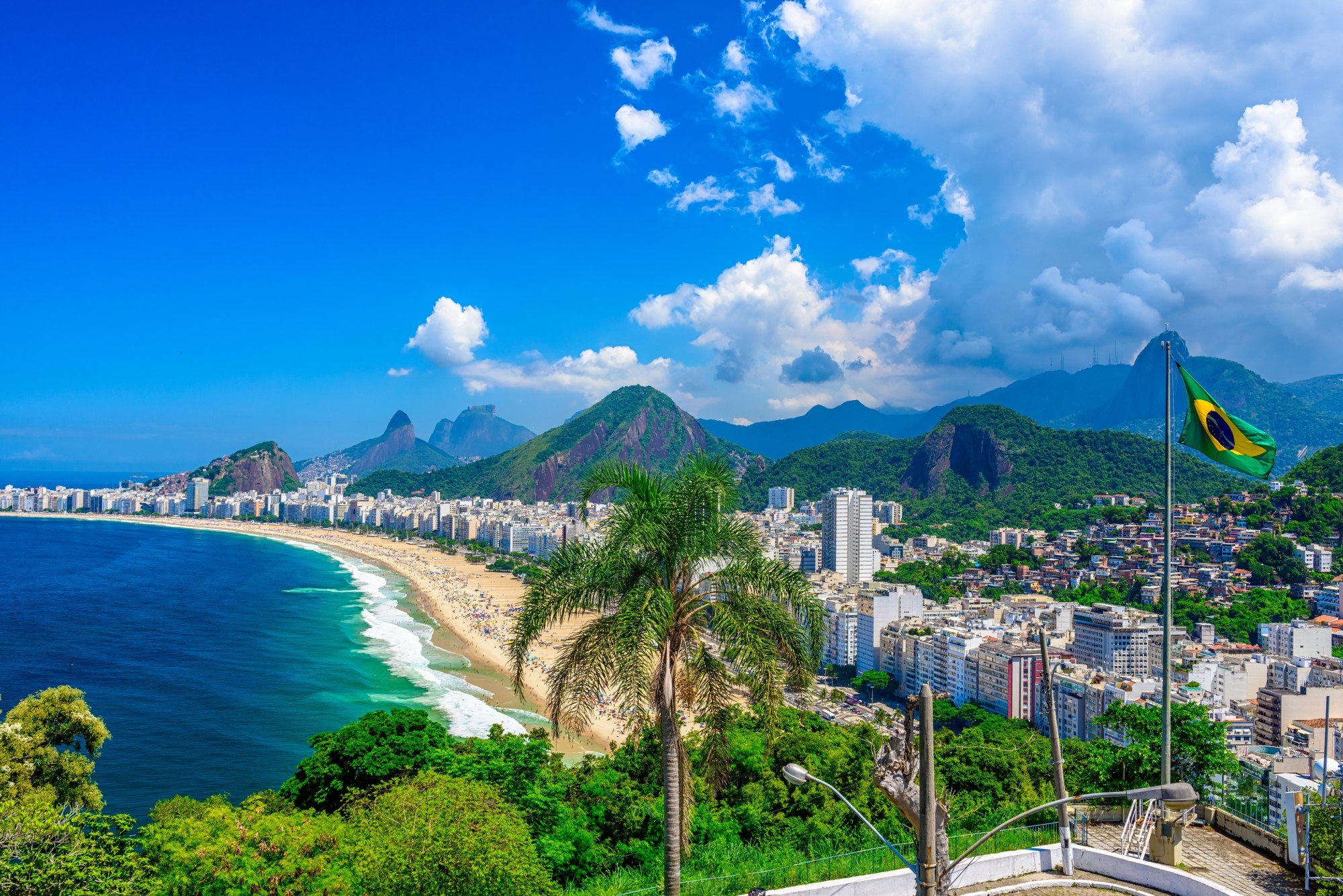
Vacation Rentals and Rental Income
Baía Formosa, Natal, and the Pipa Region – the Potential for Vacation Rentals in Rio Grande do Norte
Baía Formosa is an emerging short-term rental market that is increasingly attracting the attention of investors seeking unique locations. According to AirROI data (July 2024–June 2025), there are approximately 26 active Airbnb listings in this town. The average annual revenue per property is $7,422 (approximately BRL 38,000–40,000), with an attractive daily rate of $131. The top 10% of listings generate over $17,000 annually, demonstrating that well-managed properties—especially those with high standards and that stand out from the competition—can achieve above-average results. Although revenues in the region declined by 26.2% last year, due to seasonality and a growing number of listings, this is a clear signal to investors that a proper management strategy, proper positioning, and leveraging the potential of a location can translate into solid results.
By comparison, in Natal – a mature market with a developed tourist infrastructure – property prices increased by 7-8% year-on-year. In the popular Ponta Negra district, revenues from short-term rentals increased by a staggering 29% year-on-year, with an average occupancy rate of 57%. Meanwhile, the Pipa region, which belongs to the same ecotourism corridor as Baía Formosa, is already home to planned new investments and enjoys high tourist interest year-round.
Both emerging markets like Baía Formosa and mature markets like Natal offer distinct yet complementary advantages. Baía Formosa offers the opportunity to enter the market at an earlier stage of development, with the potential for property value and revenue growth, while established locations guarantee greater predictability. Vacation rentals in Brazil can generate 8-12% gross annual returns, and premium projects like Aventora have projected net returns of up to 15.32% annually (for an investor with Polish tax residency), assuming professional management and favorable market conditions.
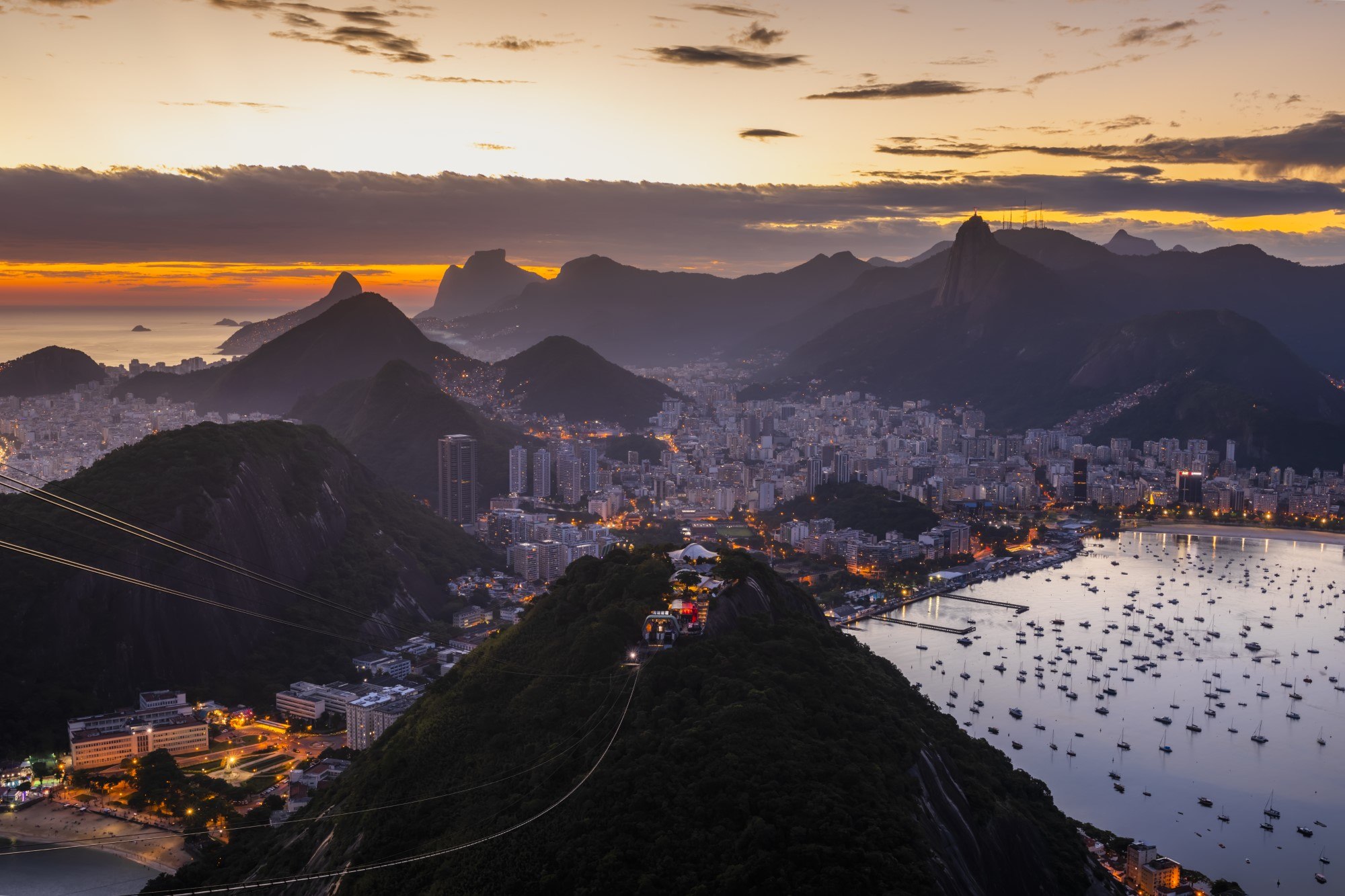 real estate in Brazil[/caption]
real estate in Brazil[/caption]
Long-term rental
Provides more stable, albeit lower, returns (4-7% gross annually). Demand is driven by structural factors in large cities, such as labor and student migration. The main markets are São Paulo and Rio de Janeiro.
Tourism Investment and Real Estate Demand
There is a direct and strong correlation between tourism investment and rising real estate prices. Data clearly shows that the tourism boom is fueling real estate demand. In 2024, foreign investment in Brazilian tourism increased by 231%, reaching $212 million, a trend expected to continue in 2025.
This capital inflow translates into tangible results in local markets. In the state of Bahia, a 62.8% increase in the number of foreign tourists coincided with a 20% increase in property values in upscale neighborhoods of Salvador over two years. In Natal, the reform of the zoning plan and the development of tourism contributed to a 7.6% increase in real estate prices.
A clear cause-and-effect chain can be observed:
- Public and private investments improve tourism infrastructure (airports, roads, hotels);
- Improved infrastructure attracts more tourists;
- Increased tourist traffic generates high demand for short-term rentals;
- High rental yields attract investors to the real estate market, leading to price increases.
For the strategic investor, the conclusion is clear: monitoring data on tourism investments and planned infrastructure projects is a key leading indicator, allowing them to identify future emerging real estate markets before their potential is fully reflected in prices.
Main Investment Locations in Brazil
The four highlighted regions demonstrate distinct investment strategies, tailored to different investor goals and risk profiles.
Fortaleza: Beachfront Condominiums and Vacation Apartments
Fortaleza is a mature market focused on generating cash flow from vacation rentals. The city receives over 2.5 million tourists annually, many of them from Europe. Investors are most interested in beachfront apartments, particularly in the Meireles and Praia do Futuro districts, which offer high return potential for short-term rentals. This strategy focuses on cash flow.
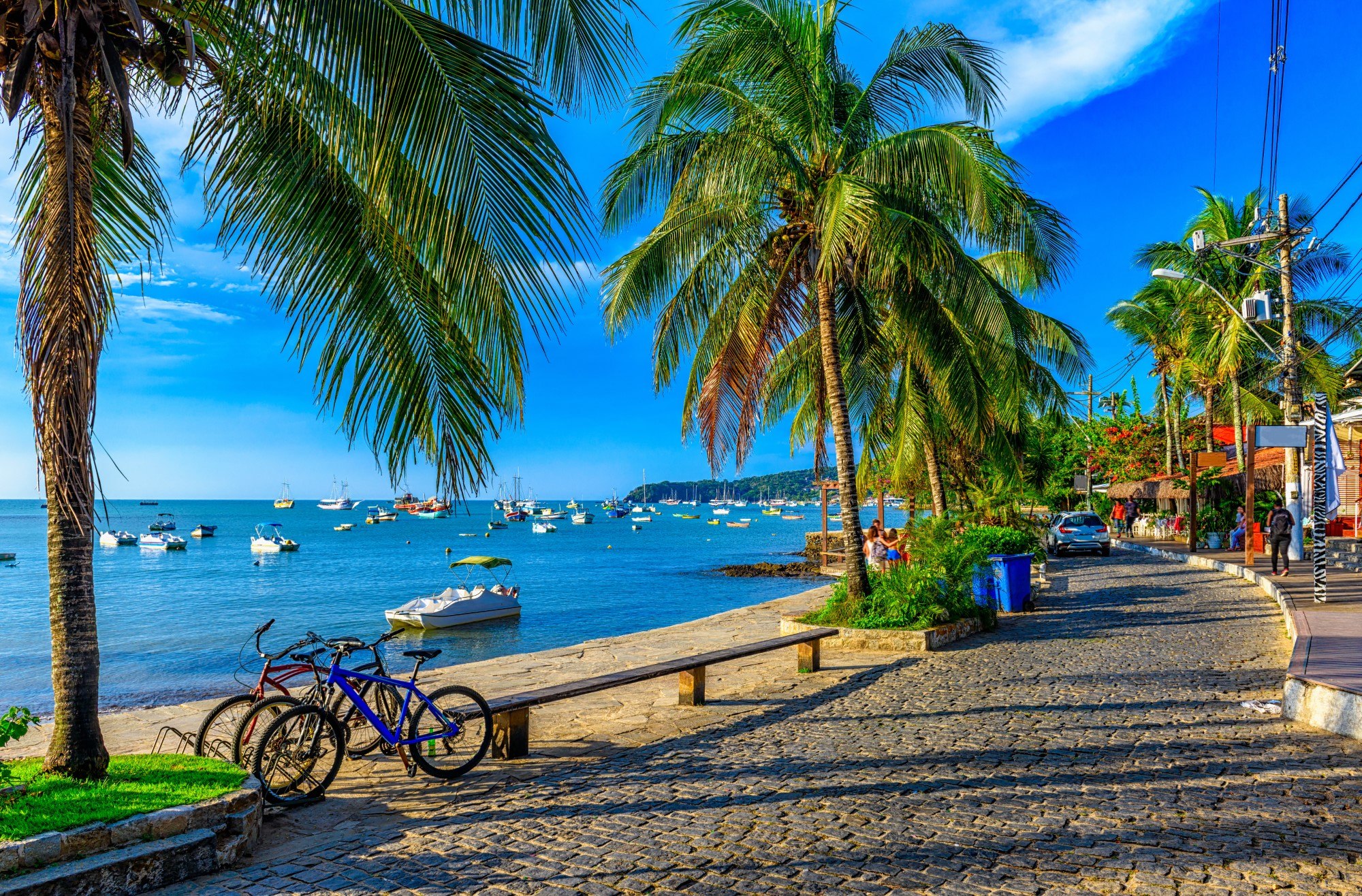
Rio de Janeiro: Luxury Residences and Prestigious Neighborhoods
Rio de Janeiro is an icon of the Brazilian luxury market. Purchasing real estate in the Leblon or Ipanema districts involves high acquisition, maintenance, and tax costs, but in return, it provides ownership of a trophy asset—a globally recognized asset with a high degree of resilience to depreciation. This strategy focuses on capital preservation and long-term value appreciation.

São Paulo: Investment Apartments and the Premium Market
São Paulo, the financial center of Latin America, offers a relatively low-risk and highly liquid market. Steady rental demand is driven by the corporate sector and the academic community. Small, well-located apartments in neighborhoods like Vila Olímpia and Pinheiros generate stable income from long-term rentals. This is a “low-risk annuity” strategy, particularly appreciated by investors seeking predictability.
Bahia and Ceará: Developing Regions with Potential
Northeastern Brazil, encompassing the states of Bahia, Ceará, and Rio Grande do Norte, is a dynamically developing region with lower prices than in large metropolitan areas. The growth of eco-tourism, growing popularity among foreign buyers, and new infrastructure investments are fostering capital appreciation. Examples include land, eco-villas, and intimate estates in towns like Baía Formosa. This is a higher-risk, but potentially highest-return strategy, suited to the profile of a venture capital investor.
The Primary Market and the Role of Developers
New Investments and Developer Offers
Despite relatively high interest rates, the Brazilian development sector remains resilient. New projects are being launched regularly, with developers taking advantage of government support programs like “Minha Casa, Minha Vida” (social housing) and focusing on the construction of sought-after compact units.
In Brazil, the primary market comprises apartments and houses sold directly by developers – both in the early pre-sale stage (before construction begins) and in shell or fully finished, move-in ready condition.
Developers handle the entire process: from land purchase, through design and construction, to sale. This integrated model provides buyers with:
- better quality control,
- brand consistency,
- greater certainty about completion dates.
Developers handle the entire process: from land purchase, through design and construction, to sale. This integrated model provides buyers with:
- better quality control,
- brand consistency,
- greater certainty regarding completion dates.
Buyers can also count on:
- better prices – especially at the pre-sale stage, often with additional discounts.
- personalization – the ability to choose finishes and room layouts (depending on the construction stage).
- security – transactions are regulated, and large developers are supported by banks and national programs.
Developers are increasingly using digital tools:
- virtual apartment tours,
- online financing options,
- automation and artificial intelligence in customer service.
Purchase of real estate directly from the developer
Purchase of real estate during the construction phase (off-plan) comes with a number of benefits, such as a lower price, the ability to customize finishes, and attractive financing terms. A key element that significantly reduces the risk of such transactions is a legal mechanism known as the Patrimônio de Afetação.
This is a Brazilian legal mechanism in which the assets and financial resources of a specific investment are separated from the rest of the developer’s business. Buyers’ funds are placed in a dedicated account and can be used exclusively for the construction of that project. In the event of a developer’s bankruptcy, the property and accumulated funds are protected from their creditors, significantly increasing the security of the transaction.
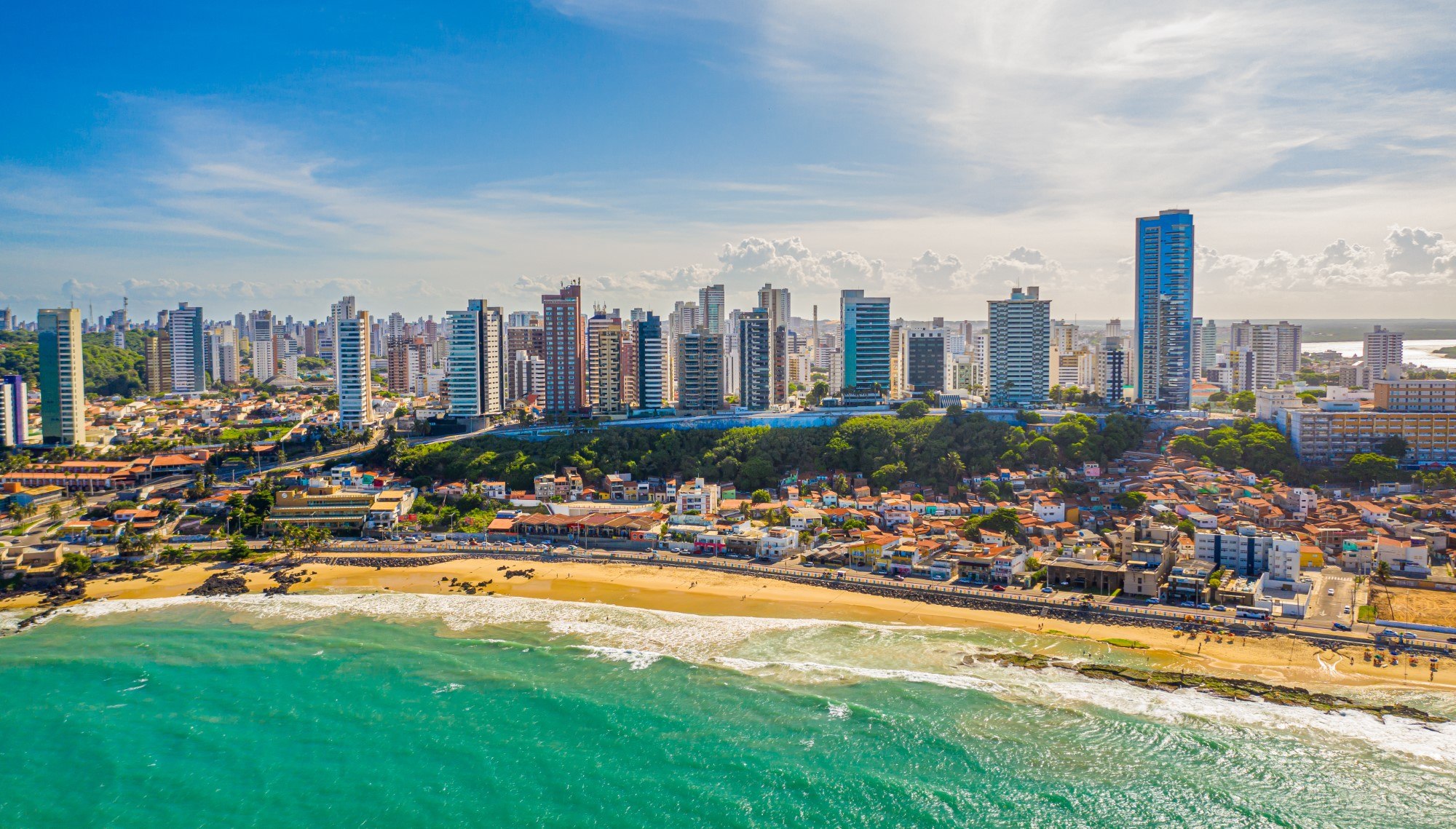
Trends and prices in the Brazilian real estate market
In 2025, the Brazilian residential real estate market is expected to maintain stable growth at a compound annual growth rate (CAGR) of approximately 5.3%. This is driven by factors such as urbanization, digitalization, and the growing demand for spacious homes.
The villa and single-family home segment is experiencing particularly dynamic growth, growing by an average of 5.5% annually. This is the result of changing preferences – post-pandemic, more and more people are seeking comfort and more space, especially due to the rise in remote work.
Real Estate Prices in Brazil and Their Growth
Brazilian real estate prices are rising rapidly in 2025. The FipeZAP index, which tracks housing prices, increased by 7.97% year-on-year, and in some cities, such as Salvador, price increases exceeded 15–20%.
The Rio Grande do Norte (RN) region boasts some of the highest prices in the country – the median home price is approximately BRL 14,551 per square meter. This growth is driven by both local buyers and foreign investors, as well as a shortage of modern villas near the coast. Buying real estate in Brazil is not just a lifestyle choice these days, but also a strategic investment in a growing market.
Housing Price Index and its importance for investors
Key economic indicators in Brazil, helping to analyze prices, construction costs, and the overall market condition.
Market Prices and Construction Costs:
- FipeZAP Index: the most important indicator of average sales and rental prices in Brazil’s largest cities. It allows investors to track trends, compare prices between regions, and assess the best time to buy or sell a property;
- INCC (National Construction Cost Index): used primarily to adjust installments for properties purchased during construction. It reflects changes in material and labor prices, which directly impacts the final cost of a development project;
- SINAPI (National System of Construction Costs): determines the average construction cost per square meter in various parts of the country. It is a key tool for developers and engineers when budgeting projects.Impact of inflation on real estate:
- IPCA (Official Inflation Index): has a direct impact on the market because it determines interest rates (SELIC). Higher inflation and interest rates mean more expensive mortgages and less purchasing power;
- IGP-M (General Market Price Index): Historically used to index leases. Currently, it is losing popularity in new contracts due to its high volatility.
Sector Indicators:
- IVG-R (Index of Real Estate Collateral Value): Monitors changes in the value of properties used as collateral for mortgages. It helps assess the financial health of assets in the market.
- Abrainc-Fipe Index: tracks activity in the primary market, including the number of new listings, sales, and cancellations. This is an essential data source for developers and large investors.
Housing Demand and the Housing Shortage
The Brazilian market continues to experience high demand for housing, particularly in large cities and tourist-friendly regions. This is primarily due to the nationwide housing shortage, which is estimated at over 6 million units, most of which are affordable housing.
In the Rio Grande do Norte region, there is strong demand for real estate, especially for beachfront villas in towns such as Pipa, Tibau do Sul, and Natal. The location, access to luxury infrastructure, and proximity to nature increase property values and attract both affluent domestic and international buyers.
Sustainable Construction and New Development Directions
Eco-friendly Solutions in Development Projects
Sustainable construction is gaining importance in Brazil, with the country implementing international environmental standards such as LEED and AQUA-HQE.
Modern Brazilian development projects routinely implement eco-friendly solutions to attract environmentally conscious buyers and reduce operating costs. The most popular include:
- Low-impact architecture;
- Use of local, renewable materials;
- Solar panels and rainwater harvesting systems;
- Passive cooling and natural ventilation, reducing the need for air conditioning;
- Use of native vegetation in the landscape, minimizing water consumption;
- Waste sorting and composting systems.
A prime example of this trend is the Arteco Estrela project, including its first phase, Aventora, in Baía Formosa. The project is distinguished by its philosophy of active regeneration, which goes beyond standard sustainability. The goal is not merely to minimize damage, but to actively restore and enrich local ecosystems.
The project’s main initiatives focus on real and measurable environmental impact:
- Atlantic Forest Restoration: Mass planting of native tree species in collaboration with the local community. A key element is the creation of a private nature reserve covering nearly 180 hectares, which will remain untouched to support the natural regeneration of the forest;
- Coastal Protection and Blue Carbon: Mangrove forests, which are extremely efficient at absorbing CO2, are receiving special protection. The project aims to obtain “Blue Carbon” certification for them. The proceeds from the carbon credits thus obtained will be reinvested directly in the protection of these valuable marine ecosystems;
- Support for local biodiversity: active support for local wildlife monitoring and protection programs, including endangered species of sea turtles and dolphins;
- Community involvement: the regeneration philosophy also extends to the local community, which is engaged through educational programs and collaborative pro-environmental initiatives.
The Impact of Sustainable Construction on Property Values
In Brazil, properties built using eco-friendly technologies have a significantly higher market value. This translates into:
- higher resale price (average 8-12% according to GBC Brasil);
- better financing terms, for example, through government environmental programs;
- greater attractiveness to foreign buyers and higher rental income.
For Aventora investors within Arteco Estrela, this means that their property will not only be more resilient to market changes but will also yield lower maintenance costs and higher returns. Compliance with environmental regulations minimizes risk, while the unique location in Baía Formosa – a region with exceptional biodiversity and proximity to an international airport – further enhances the investment’s attractiveness. With the growing global demand for an eco-friendly lifestyle, projects like Aventora are becoming synonymous with modern, eco-conscious comfort.





